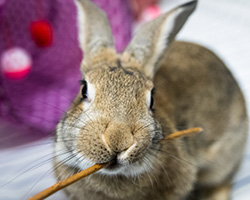Rabbits Make Excellent Household Pets!
Info you can use for these cute and cuddly herbivores
From Rex to Angora to the French Lop, there are a wide variety of domestic rabbits, and the Animal Rescue League of Boston (ARL) routinely has a large population of adoptable rabbits to choose from.
Aside from being a great option for families living in smaller spaces, rabbits are incredibly clean, intelligent, friendly, and curious, making them fantastic pets!
Rabbit Basics
ARL believes that rabbits should always be housed indoors.
Your rabbit’s enclosure must be large enough to contain a litter box (yes, they can be litter box trained!), food bowls, a place to sleep, and enough room to explore and play.
Additionally, rabbits should experience at least three hours of out-of-enclosure time every day.
This allows rabbits more space to explore and play, and time for you to handle, work on training and cuddle up, which will strengthen the bond between you and your rabbit.
A Proper Diet
Rabbits need a variety of food in order to stay healthy, happy, and active.
The bulk of their diet should be high-quality fresh greens, with timothy hay provided at all times.
Pelleted rabbit food should used only as a supplement to the greens.
You’ll want to avoid alfalfa hay and alfalfa pellets, as alfalfa is too high in protein.
And while we all associate rabbits with carrots, carrots and fruit should only be offered in moderation as occasional treats, as the sugar content can promote tooth decay and also lead to weight gain.
Grooming
To keep you rabbit’s fur fluffy and mat-free, brushing should be a regular part of their out-of-enclosure time.
Keep in mind the frequency of brushing will depend on the length of your rabbit’s fur, and how well they groom themselves.
Brushing minimizes shedding, maintains a healthy coat, and aids in reducing hair ingestion.
Nail Trimming
Just like cats and dogs, rabbits need their nails trimmed carefully so as to not hit the blood vessels that run through the base of the nail (commonly called the “quick”).
Use a clipper designed specifically for pets, and nails should be trimmed every 3-4 weeks.
While trimming your rabbit’s nails, look for any urine staining on the paws, which is a sign the enclosure needing to be cleaned more regularly.
Oral Health
Rabbits need to have their mouths checked every few weeks for abscesses, as well as any abnormalities in their teeth.
Should you find any abnormalities, you’ll want to follow up with your regular veterinarian for a visit.
If your rabbit will not allow this type of handling, check for bad breath, drooling, eye or nasal issues, which are all signs of dental issues.
A proper diet will go a long way in promoting good oral health!
Litter Box
As previously mentioned, rabbits can be litter box trained!
Litter boxes designed for rabbits are available, but you can also use one made for cats.
Place a layer of hay on top of the litter, as this will entice the rabbit into the box to eat the hay and they often go to the bathroom and eat at the same time.
A second litter box is also recommended for use while your rabbit is exploring out of the enclosure.
Behavior
Over time, you will get to know your own rabbit’s favorite games and what truly makes them happy, as well as what he/she is trying to communicate to you with specific behaviors.
Here are a few behavior-related tips:
-
- Chewing – Rabbits teeth grow continuously; therefore, they need things to chew in order to keep their teeth filed down. They can also chew if they’re bored or stressed.
- Digging – Burrowing and digging is fun for rabbits. Give your rabbit a box of hay, or even just a big blanket that they can dig into.
- Napping – Rabbits are most active during the morning and evening. During the middle of the day, they tend to enjoy short naps with small amounts of activity in-between.
- Grunting/Thumping – Grunting and thumping are ways that your rabbit is telling you they are frightened, angry, or annoyed. You’ll want to give your rabbit a little space if you see these behaviors.
- Chinning – Sometimes your rabbit may rub their chin on your stuff. This is your rabbit’s way of getting his/her scent all over your things in order to claim it as their territory.
- Nudging – At times, your rabbit may approach you and nudge you gently with their nose. This can either mean they would like to be pet, or that you are in their way.
- Binky – When your rabbit is really happy and having fun, they may run around your house and randomly jump up in the air, kicking their legs and wiggling their bodies – it’s of course very cute and fun to watch!
Ready to Adopt?
If you think a rabbit would be a great addition to your home and family, ARL is here to help.
ARL’s three Animal Care and Adoption Center locations routinely have a number of rabbits who are waiting for their perfect match, and the Adoption Forward adoption process is a conversation-based, application-free process designed so that the needs of both the animal and the adopter are understood and compatible with one another.


